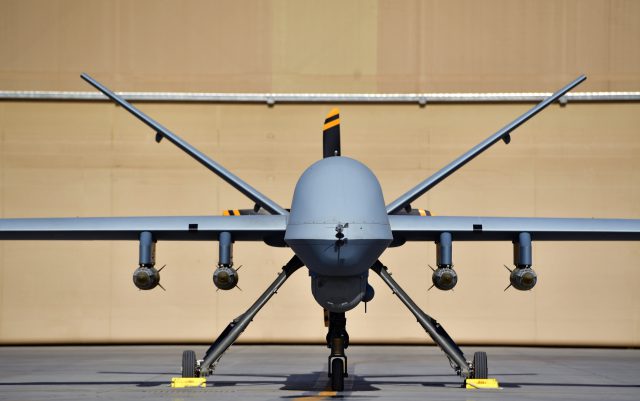
Late last week a US drone killed Maulana Fazlullah, the leader of the Pakistani Taliban—known as the Tehrik-i-Taliban Pakistan (TTP)—in Afghanistan’s eastern Kunar province. This is a serious body blow to the TTP, which had already been significantly weakened by several counter-insurgency and counterterrorism operations in recent years.
Fazlullah, who was 44 years old, was a particularly nasty individual. He took over as the TPP’s leader after another US drone strike killed his predecessor, Hakimullah Mehsud, in November 2013. Fazlullah sought the imposition of Sharia law throughout Pakistan. He led the insurgency in the Swat valley in 2007–2009 during which music and barber shops were banned and girls were discouraged from going to school. It took some 35,000 troops to dislodge him and his fighters from that area.
But Fazlullah will be especially remembered for two notoriously vicious terrorist acts. First he ordered the assassination in 2012 of 15-year-old Malala Yousafzai because of her advocacy of education for girls. She was badly injured in the terrorist attack but recovered, and was eventually awarded the Nobel Peace Prize in 2014.
Second, Fazlullah ordered what was undoubtedly one of the most brutal terrorist attacks in the history of Pakistan: the slaughter of over 130 children at a school in Peshawar. That assault on the school where many military officers send their children marked a decisive turning point in Pakistan’s fight against the Taliban and its supporters.
Following the school massacre, then Prime Minister Nawaz Sharif abandoned all attempts to negotiate with the TTP. The government implemented its counterterrorism National Action Plan, reimposed the death penalty and launched Operation Sword of the Prophet in North Waziristan in 2015.
Importantly, the military made clear that it would no longer differentiate between a ‘good’ Taliban (one that only killed Western forces in Afghanistan, but not Pakistani forces) and a ‘bad’ Taliban (one that killed Westerners and Pakistanis alike). The new approach seems to have paid off. The number of terrorist incidents in Pakistan has significantly declined in the last two years.
Needless to say, few people, if any, will miss Fazlullah. Among Taliban leaders and fighters, Fazlullah enjoyed little respect largely because he wasn’t a Mehsud, one of the dominant tribes in Waziristan. Following the death of Hakimullah Mehsud, there were many anti-American demonstrations condemning his assassination. I suspect the same won’t happen this time. On the contrary, his elimination will be welcomed by many. Chief among them will be the military, which stated that Fazlullah’s death ‘gives relief to scores of Pakistani families who fell victims [sic] to TTP terror’.
But most importantly, Fazlullah’s departure provides a major opportunity to improve relations between Pakistan, Afghanistan and the US. Pakistan has complained for several years that Afghanistan didn’t do enough to hunt down Fazlullah and others hiding in the eastern part of the country.
Military operations in Pakistan’s tribal areas had reduced the Taliban’s safe operational space and had forced Fazlullah to flee across the border. From there, however, he continued to launch attacks into Pakistan. With his removal, cross-border operations will probably diminish, eliminating a major obstacle in bilateral relations.
We can also expect relations between Pakistan and the US to improve—albeit from a very low point. America’s removal of Pakistan’s most wanted terrorist will go some way towards rebuilding US–Pakistan bilateral relations that have been particularly poor since President Donald Trump announced his South Asia policy last August and accused Islamabad of harbouring terrorists. It’s unlikely that the Trump administration will reverse its decision to suspend $2 billion in military aid to Pakistan. Even so, a sense that Washington and Islamabad are pulling in the same direction could begin to build much-needed trust between the two capitals.
As for Fazlullah’s replacement, it’s difficult to see how a leader will take control either quickly or smoothly. The TTP is highly factionalised, divided along tribal and operational lines and with conflicting economic interests. Its weakened state, as well as the uncertainty about its future direction, may prompt fighters to defect to the Islamic State affiliate in Khorasan province. That wouldn’t be good news for the long-term stability of Pakistan.
In the meantime, the country will hold federal and provincial elections late next month. The Pakistan Muslim League-Nawaz, which governed until recently handing over to a caretaker administration until the election, will want to take credit for Fazlullah’s elimination. Former Prime Minister Sharif can legitimately claim responsibility for the significant decrease in terrorist attacks under his watch, albeit with a lot of support from the military.
Sharif’s achievement should help his party return to power, most likely with a reduced majority. Such an outcome would be a positive development for Pakistan. An electoral victory for former test cricketer, Imran Khan, who’s highly critical of US policy in the region, would be bad for US–Pakistan relations and would almost certainly set back any prospect for peace in Afghanistan.

